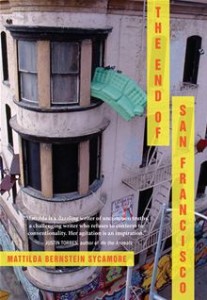 The End of San Francisco
The End of San Francisco
by Mattilda Bernstein Sycamore
City Lights. 186 pages, $15.95
AUTHOR Mattilda Bernstein Sycamore is the artistic love child of Jean Genet and David Wojnarowicz, deconstructing language swathed in unbridled sensuality, while flinging readers into a disrupted, chaotic life of queer anarchy. I first encountered Sycamore a decade ago at a D-I-Y alternative space in San Francisco, reading stories drawn from sex work.
Since that time, s/he has prolifically chronicled a life of a strident anti-assimilationism, meanwhile evolving both as a writer and activist. Through novels, anthologies, cultural writing, and community organizing, Sycamore torches normative assumptions and “the violence of the status quo,” seizing self-determination through direct action and political rage. The End Of San Francisco is an episodic memoir in which readers are brought nose-to-page with a narrative mélange of childhood anorexia, sexual abuse, and present-day attempts at healing. Images cascade and collide with one another in an accomplished literary cadenza of salvation.
Returning to the polyester family home of teak tables and pink and green bathroom tiles to confront a dying father about his molestation, there is no acknowledgement or apology, no deathbed reconciliation. Back-story details are fleshed out in flashbacks to childhood. Identity morphs, personas are tried on and flung off: the teenage gay boy cruising public bathrooms, the club kid dressed and tweaked to the nines, the burgeoning act up politico, who moved to San Francisco in the early 1990s and created a community of outsiders that redefined the family.
Queer punks empowering each other, living beyond gender, tumultuously on the fringe: shoplifting, turning tricks, appropriating, organizing, and spewing ideology. At night, the demimonde of public sex erupted in bars, video booths, after-hours clubs, and on-line—desperate and defiant. In addition to the sex, prescriptions for an evening’s entertainment included cocktails followed by ecstasy, a bump of coke, Special K, pot, and then Xanax to unwind.
The author exudes a performative life, and the kaleidoscopic stream-of-conscious writing reflects the whirling, contradictory complexities of Sycamore’s coming into being: “We were the first generation of queers to grow up knowing that desire meant AIDS meant death, and so it made sense that when we got away from the other death, the one that meant marriage and a house in the suburbs, a lifetime of brutality both interior and exterior and call this success or keep trying, keep trying for more brutality, but when we got away it made sense that everywhere people were dying of AIDS and drug addiction and suicide because we had always imagined death. … We went crazy and cried a lot, or went crazy and stopped crying, or just went crazy.”
By the end of the ’90s, with gentrification fragmenting San Francisco, the writer became one of the instigators of the Gay Shame movement—a radical alternative to “gay pride”—railing against misogyny, racism, and the corporate takeover of the queer community, but to little avail. Despair and exhaustion from the crippling chronic pain of fibromyalgia further imploded the Shangri-La that once had beckoned. Eventually, Sycamore relocated, and currently lives in Seattle.
________________________________________________________
John R. Killacky is executive director of the Flynn Center for the Performing Arts in Burlington, VT.





